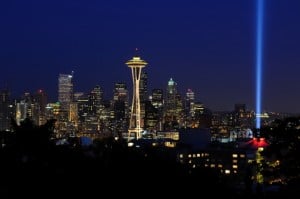Only one hurdle left for Seattle regulations on short-term rentals like Airbnb

The final vote by the full council is set for Monday, with some changes possible.
Council members say their goals are to preserve the city’s housing stock for people who live in Seattle and to control a rapidly growing industry that’s competing with hotels as it serves mostly visitors.
The full council passed separate legislation Monday defining short-term rentals as certain units offered for fewer than 30 consecutive nights.
Under the proposed regulations, which would take effect in 2019, new operators would be limited to renting out their primary residence and one additional unit, while existing operators across most of the city would be limited to renting out two units (three if adding their primary residence at a later date).
There would be a carve-out for existing operators in downtown, Uptown and South Lake Union and for those using small buildings constructed before 2012 on First Hill and Capitol Hill. They would be allowed to continue renting out any number of units they operate now, plus their primary residence and one additional unit.
Councilmember Rob Johnson, who chairs the land-use committee, said former Councilmember Tim Burgess agreed to the carve-out in exchange for a group of short-term rental operators dropping a State Environmental Policy Act (SEPA) appeal.
Another reason for the downtown carve-out was to avoid hurting the corporate short-term-stay businesses concentrated there, Burgess said, confirming the SEPA appeal deal.
On Monday, Johnson pushed to grandfather in the units of existing operators everywhere in the city. He said his approach would be simpler, protect jobs and reduce the risk of the city being sued by people with units outside downtown.
“For me, the carve-out seems pretty arbitrary,” Johnson said after the committee vote. “By grandfathering in only one small section of the city, we may be on weaker legal ground.”
Johnson also said his approach, by keeping more short-term rentals in operation, would result in more revenue for the city. The council passed a new tax on short-term rentals this past month.
But other council members, including Mike O’Brien and Lisa Herbold, said they want the regulations to push units from the short-term rental sector to the permanent housing market.
There’s a shortage of housing for Seattle renters and homebuyers, and the conversion of units into visitor rentals has contributed to gentrification, particularly affecting low-income people and people of color, they said.
“For me, this discussion has always been about housing affordability and the supply of housing long-term,” Herbold said.
There are now about 6,600 active short-term rentals in the Seattle area listed on Airbnb, according to a third-party site that tracks data related to the company.
The city has lost more than 2,000 housing units to the short-term rental market in recent years, Giulia Pasciuto, an analyst with the nonprofit advocacy organization Puget Sound Sage, told council members Monday.
The council has estimated that the regulations would render several hundred units no longer eligible to be operated as short-term rentals.
Councilmember Sally Bagshaw is considering asking the council to shrink the carve-out area for existing operators. She’s heard complaints from condominium residents about short-term rental operators taking over their buildings.
On Monday, Belltown condo resident Noelle Million asked the council to stop “the ever-increasing number of tourists invading my home.”
But several short-term rental operators — including some who started in the business years ago, before Airbnb arrived on the scene — warned the council Monday about the regulations impacting their livelihoods and resulting in lost jobs.
“My wife and I created our business doing something that, at the time, was legal,” said Andy Morris, general manager of Seattle Vacation Home, which operates short-term rentals in Madison Valley and nearby.
“In the interest of fairness, it seems appropriate to grandfather those who have been acting in good faith, as we have.”
Darik Eaton, of Seattle Oasis Vacation Rentals, called the downtown carve-out a compromise. During negotiations months ago, city officials made it clear they didn’t want to grandfather in short-term rental units everywhere.
“The council members were more willing to give in” to the operators downtown “because those areas aren’t affordable” for most long-term renters and homebuyers anyway, Eaton said.
People forced to stop operating units as short-term rentals would have the option of converting those units to long-term rentals, O’Brien noted.
And people who manage short-term rental units for multiple owners would be able to continue that business.
The proposed regulations would require short-term rental operators and platforms to obtain special licenses from the city and pay license fees.
Laura Spanjian, Airbnb’s Northwest public-policy director, praised Seattle’s proposed regulations Monday.
The short-term rentals tax passed last month will be collected starting in 2019 and will be $14 a night for entire homes and $8 a night for rooms. The proceeds will be used to support community-development projects and to create affordable housing.
Seattle officials began working on short-term rental regulations more than a year ago. A full council vote was postponed this past month to allow more discussion.
Source: seattletimes.com















 Accessibility
Accessibility